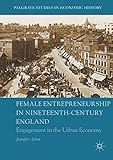Female entrepreneurship in nineteenth-century England engagement in the urban economy / Jennifer Aston.
Material type: TextSeries: Publication details: [Cham] : Palgrave Macmillan, (c)2016.Description: 1 online resourceContent type:
TextSeries: Publication details: [Cham] : Palgrave Macmillan, (c)2016.Description: 1 online resourceContent type: - text
- computer
- online resource
- 9783319308807
- 3319308807
- HD6072 .F463 2016
- COPYRIGHT NOT covered - Click this link to request copyright permission: https://lib.ciu.edu/copyright-request-form
| Item type | Current library | Collection | Call number | URL | Status | Date due | Barcode | |
|---|---|---|---|---|---|---|---|---|
 Online Book (LOGIN USING YOUR MY CIU LOGIN AND PASSWORD)
Online Book (LOGIN USING YOUR MY CIU LOGIN AND PASSWORD)
|
G. Allen Fleece Library ONLINE | Non-fiction | HD6072.6.7 (Browse shelf(Opens below)) | Link to resource | Available | ocn957683691 |
Browsing G. Allen Fleece Library shelves, Shelving location: ONLINE, Collection: Non-fiction Close shelf browser (Hides shelf browser)
Includes bibliographies and index.
Introduction -- Chapter 1: Locating Female Business Owners in the Historiography -- Chapter 2: Women and their Businesses -- Chapter 3: Who was the Victorian Businesswoman? -- Chapter 4: The Social Network -- Chapter 5: Life After Death -- Conclusion.
Aston challenges and reshapes the on-going debate concerning social status, economic opportunity, and gender roles in nineteenth-century society. Sources including trade directories, census returns, probate records, newspapers, advertisements, and photographs are analysed and linked to demonstrate conclusively that women in nineteenth-century England were far more prevalent in business than previously acknowledged. Moreover, women were able to establish and expand their businesses far beyond the scope of inter-generational caretakers in sectors of the economy traditionally viewed as unfeminine, and acquire the assets and possessions that were necessary to secure middle-class status. These women serve as a powerful reminder that the middle-class woman's retreat from economic activity during the nineteenth-century, so often accepted as axiomatic, was not the case. In fact, women continued to act as autonomous and independent entrepreneurs, and used business ownership as a platform to participate in the economic, philanthropic, and political public sphere.
COPYRIGHT NOT covered - Click this link to request copyright permission:
There are no comments on this title.






